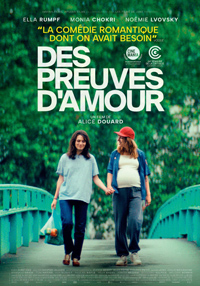Evidence of Love: Douard’s Debut Reads Between the Lines of Maternal Affections
 While it plays like something of a specific time capsule, Alice Douard’s Love Letters is really about a compounded state of transition, conflating fluctuating cultural realities with one woman’s personal reckoning on the precipice of motherhood. The French language title, Des preuves d’amour, more aptly translates to Proofs of Love, which refers to the written statements its protagonist must collect from friends and family as part of her court dossier to adopt the unborn child of her wife. In essence, these statements are letters addressed to the court but are imbued with reflected expectations proving the capabilities of the subject, a woman who needs to display she is loved by her support group, and therefore has the tools to give love herself. The anxiety at the heart of the story is not governmental fears and potential interference whilst tentatively exploring a new horizon granting equal rights to the LGTBQ+ community but the unpredictability of an emotionally estranged mother from the previous generation whose ambivalence may have the power to derail her lesbian daughter’s best laid plans.
While it plays like something of a specific time capsule, Alice Douard’s Love Letters is really about a compounded state of transition, conflating fluctuating cultural realities with one woman’s personal reckoning on the precipice of motherhood. The French language title, Des preuves d’amour, more aptly translates to Proofs of Love, which refers to the written statements its protagonist must collect from friends and family as part of her court dossier to adopt the unborn child of her wife. In essence, these statements are letters addressed to the court but are imbued with reflected expectations proving the capabilities of the subject, a woman who needs to display she is loved by her support group, and therefore has the tools to give love herself. The anxiety at the heart of the story is not governmental fears and potential interference whilst tentatively exploring a new horizon granting equal rights to the LGTBQ+ community but the unpredictability of an emotionally estranged mother from the previous generation whose ambivalence may have the power to derail her lesbian daughter’s best laid plans.
Paris, 2014. In the wake of marriage equality in France, Celine (Ella Rumpf) and Nadia (Monia Chokri) have decided to tie the knot and start a family. Together, they went to Denmark for IUI (Insemination Treatment) as the country allows for children to eventually seek out their biological donor in the future. Their decision to marry was partially instigated by French laws regarding genetics and guardianship, as Celine, who is not carrying the child, will need to legally adopt the child Nadia gives birth to, which can take upwards of a year to obtain. But considering the newness of marriage equality, they’re one of the first couples to navigate their options in this recent progressive leaning legal system. Required to obtain fifteen testimonials regarding her desire to parent from friends and loved ones (“and not from only lesbian friends,” she’s advised), Celine is confronted with the uncomfortable necessity of speaking with her mother, famed pianist Marguerite Orgen (Noemie Lvovsky), whose career forced her to be something of an absentee mother. The fussy Marguerite (who is annoyed when her daughter enters the apartment without bothering to knock) is surprised to learn Celine is not only married but expecting a child. Slowly, they work through a superficial politeness as Celine builds up to her request from Marguerite to pen a letter of recommendation to the court.

Although set in 2014, at the onset of marriage equality in France, Douard’s documentation of various micro aggressions with which Celine and Nadia are constantly confronted are hardly a remnant of the past. What the narrative astutely captures is the compounding of these confrontations for queer people in both the private and public spheres, and Douard juxtaposes both women’s familial experiences defining their behaviors. It would seem Nadia hails from a more preferable, if somewhat loquaciously caustic background, with a brief appearance from Anne Le Ny as a mother who admits she cannot think about her daughter without envisioning what’s going on in her bedroom, as a opposed to Nadia’s heterosexual sister. But the lion’s share of the internalized trauma belongs to Celine, with Ella Rumpf and the always exceptional Noemie Lvovsky navigating a musically underlined relationship with lurks in the shadows of something similar depicted between Ingrid Bergman and Liv Ullmann in Bergman’s Autumn Sonata (1978).
Much of Douard’s film finds the lumbering cultural progressions existing in the realm of light comedy. Celine’s lawyer is gruffly comforting, chiding her client for using ‘partner’ rather than ‘wife’ in court nomenclature. “We fought for this,” she advises. A doctor’s visit finds an awkward young man making jokes in poor taste as he documents the couple’s familial medical histories, which suggests Celine’s genetics contains a larger amount of health issues. “Good thing you’re not having the baby,” he quips without thinking. Slowly, Celine becomes aligned with the masculine quotient of the heteronormative template of procreation, the being not bearing the brunt of the physical labor and, thus, sometimes treated like a vestigial appendage. But there’s an additional layer of conflict since Celine is also a cis woman with the ability to bear children. Is she not lifting her own ‘weight’ by choosing not to bear their child? Will she not be jealous considering she won’t share any genetic make-up with their offspring? And what happens in the vulnerable year where she will have no legal claims on the child?
These anxieties are forced into the backseat as Celine procrastinates her request, needing something imperative from her mother, who will be on tour when the child is born. The power of Douard’s film arrives in Marguerite’s compromised gift to her daughter, which takes the place of all those missed opportunities she had to express how she felt about her child. Like most of our relationships with our parents, it’s perfectly imperfect, formatting the feedback Celine needs to tune out the endless confrontations she’s destined to navigate in a world which has not figured out how to weave her own familial realities into their rigid rhetoric.
Chokri has a few choice moments as Nadia, slightly older than Celine and thus subject to her own specific issues about her biological potential to bear children, but Love Letters belongs to Rumpf, navigating the internalized emotional labor she must work through as their soon-to-be transfigured future rushes swiftly toward them. Various sequences with their shared friend group, many who already have children, or strangers at the hospital (including a fainting father played by Misericordia’s Felix Kysyl) all herald a familiar, expected tone of grim but playful humor. Where the film comes to life are in those magical shared moments between the central couple, such as when Nadia and Celine flee a drunken man at a bar after a tense, ignorant exchange. But mostly it’s Rumpf’s quiet maturation as she learns to accept Marguerite’s limitations as a mother who loves her but never knew how to let her know.
Reviewed on May 17th at the 2025 Cannes Film Festival (78th edition) – Critics’ Week – Special Screening. 96 Mins.
★★★/☆☆☆☆☆


